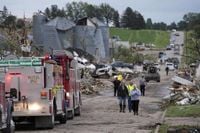DES MOINES — Nearly a year after Iowa faced devastating natural disasters, Governor Kim Reynolds has proposed legislation aimed at streamlining and funding the recovery process for affected communities. The proposal, which is now heading to her desk for approval, seeks to allocate $13.6 million from the Economic Emergency Fund to the Disaster Recovery Housing Assistance Program.
In June 2024, northwestern Iowa experienced unprecedented flooding that impacted dozens of communities and thousands of homes. This was compounded by the occurrence of 125 tornadoes across the state, leading to six tragic deaths. The legislation, introduced by Reynolds during her Condition of the State address in January 2025, aims to provide critical financial assistance to those impacted by these disasters.
Republican Representative Megan Jones, who represents Sioux Rapids and whose family was directly affected by the floods, expressed relief at the legislative progress. "I'm relieved from a lessons-learned perspective. I know that we're growing through all of this, but we're moving on from what we experienced," she stated. Jones emphasized that once the bill is signed, families affected by the natural disasters will begin receiving financial aid.
On April 16, 2025, Senate lawmakers unanimously advanced Senate File 619, and the House passed the legislation with a vote of 91-1 the following day. Governor Reynolds highlighted the urgency of the situation, stating on social media, "Last year, Iowa had three presidential disaster declarations in two months. Our relief programs were vital for helping us rebuild. I look forward to signing the disaster relief bill when it gets to my desk."
The proposed legislation will also establish a new Natural Hazard Mitigation Financing program, a revolving loan initiative designed to provide funding for projects aimed at enhancing resilience against future disasters. This program will be managed by the Iowa Department of Homeland Security and Emergency Management in conjunction with the Iowa Finance Authority.
Furthermore, the legislation will allocate an additional $2 million to the Nuisance Property and Abandoned Building Fund to assist local communities in demolishing structures that were severely damaged during the 2024 flooding and tornadoes. An additional $11.6 million will be appropriated to the Iowa Finance Authority to address claims resulting from the disasters.
Representative Ray Sorensen, whose town of Greenfield was devastated by a tornado rated EF-4, described the bill as an investment in community resilience. The Greenfield tornado had wind speeds reaching between 175 and 185 mph, resulting in five fatalities and injuring 35 individuals. "Over 100 homes flattened to their foundations in less than a minute, people ripped from their basement," Sorensen recounted. "We lost lives, and many more will never be made whole again. But we are rebuilding."
In addition to financial aid, the legislation includes several technical adjustments aimed at expediting state disaster assistance. One significant change involves modifying insurance regulations to safeguard consumers during property damage assessments post-disaster. This includes requiring licensure for public adjusters, independent adjusters, appraisers, and umpires, with strict penalties for unlicensed individuals.
Licensure applicants will be required to secure a surety bond of at least $50,000 and pass a written examination. Anyone acting as an adjuster without a license could face a Class D felony charge, which carries a potential prison sentence of up to five years and fines ranging from $750 to $7,500.
The legislation also proposes extending tax exclusions for disaster assistance aimed at housing developers who receive awards under the state disaster new housing grant program, incentivizing the rapid construction of new homes in areas affected by natural disasters. It further modifies the emergency funds transfer authority to ensure quick governmental responses during disasters.
Meanwhile, in Portland, Oregon, a different disaster funding issue has emerged. During a recent meeting of the Portland City Council, Shad Ahmed, director of the Portland Bureau of Emergency Management, revealed that the bureau could potentially lose $5 million in federal disaster relief due to a conflict with the White House regarding diversity and immigration policies.
Ahmed's concerns came to light on April 16, 2025, in response to a question from Councilor Candace Avalos about how shifting federal mandates might impact funding across city bureaus. "We were just made aware that there’s some potential language that will conflict with Portland values that will be inserted into any agreements accepting federal funding from the Department of Homeland Security," Ahmed explained. The potential loss of funding could jeopardize the jobs of seven to ten employees in his bureau, which has an annual budget of $9.5 million, half of which is sourced from federal grants.
The Bureau of Emergency Management plays a crucial role in preparing for and responding to natural disasters, including unpredictable events like severe weather, flooding, and earthquakes. Ahmed noted that if the proposed changes to contract language become finalized, they could be retroactive, affecting funding for the current fiscal year.
In a follow-up email to Councilor Steve Novick, Ahmed elaborated on the implications of the draft language being circulated by the Department of Homeland Security. He stated that it would require grant recipients to disavow principles related to diversity, equity, and inclusion, and comply with all Immigration and Customs Enforcement (ICE) requests, which directly contradicts Portland's core values.
Ahmed expressed significant concern over the potential impact on the bureau's funding and staffing, stating, "If this is finalized as-is, that would put about $5M, or somewhere between 7 to 10 full-time employees at risk, effective July 1, 2025." Portland officials are actively exploring legal options to challenge these provisions should they be finalized.
The contrasting situations in Iowa and Portland highlight the varying challenges faced by local governments in securing disaster relief funding amidst complex political and regulatory landscapes. As communities continue to grapple with the aftermath of natural disasters, the need for robust and accessible funding mechanisms remains critical to ensuring effective recovery and resilience efforts.






